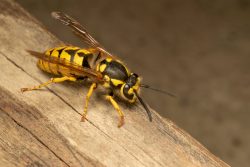What Are The Differences Between A Wasp VS Hornet?
July 25, 2022 12:00 am Leave your thoughtsAlthough hornets and wasps are often simply lumped into the same category, stingy things to stay away from, the two insects are actually quite different from one another. Knowing about the differences can help you make better pest control decisions and prevent the termination of good types of flying creatures you will want to keep around your property. Let’s take a quick look at the differences between hornets vs wasps.

Wasp or Hornet?
Most people do not realize that a hornet is a type of wasp. Most of us think of the two bugs as either interchangeable or two different insects altogether, but actually, both are true. There are approximately 100,000 species of wasps on the earth. These winged creatures are found in every part of the world, except the very cold polar areas.
How To Identify A Hornet
You may want to know how to properly identify a hornet. This could be important to know, especially if you are allergic. The hornet is a little bit fatter than other types of wasps. Some hornets have yellow and black stripes while others have black and white. It is important to know the difference between a hornet and other types of wasps because the hornet carries a very large quantity of venom. It carries much more than other types of wasps or other types of flying insects with stingers.
Important Things to Know About Wasps VS Hornets
- Both wasps and hornets will chew up wood. This can be damaging to outdoor furniture and living areas.
- Wasps and hornets build nests. Usually, these nests can be seen dangling from high perches. However, some hornets also build nests underground. These can be especially dangerous for pets and young children.
- Wasps and hornets love sugary sweet things. Keeping these items protected while outside is important to prevent painful and dangerous stings.
Should You Eliminate?
If you are concerned about wasps and hornets on your property, you should consider a few things. First, is anyone on your property allergic to wasps vs hornets? If the answer is yes, then it is a good idea to seek out Pied Piper pest control to keep these insects at a minimum. Allergic reactions to wasps and hornets can be serious, so avoiding wasp and hornet stings should be a top priority.
If no one on your property is allergic, you may want to consider observing the nests before you terminate. A regular wasp nest should not be much of a nuisance and it actually provides important pollination for the plants around your home. Eliminating a hornet nest is often a good idea though because hornet stings are so much more serious. Contact Us!
Categorised in: Hornets, Yellow Jackets
This post was written by Ken Perry
